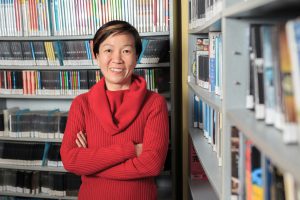February 28, 2019, by Liz Cass
Achieving balance for International Women’s Day
As part of a number of different events taking place throughout the global campuses of the University of Nottingham to celebrate International Women’s Day on Friday 8 March, senior leaders with responsibility for Equality, Diversity and Inclusion (EDI) at the UK, Malaysia and Ningbo have worked together to support a digital project to celebrate inspirational women throughout the University.
More than 140 nominations were received and the University will be celebrating the inspiring work of these women throughout the month of March. The theme of this year’s International Women’s Day is #balanceforbetter. The notion of ‘balance’ is interesting – it could refer to how we balance diversity in core teams, how we ensure balance in diversity at all levels of our organisation, or how we achieve balance in our own work and lives. In this blog Professors Sarah Sharples, Sandy Loh and May Tan-Mullins, share their own thoughts on balance.
 Sarah Sharples is Pro-Vice-Chancellor for Equality, Diversity and Inclusion and a Professor in Human Factors at the University of Nottingham. She says: “For me, balance can apply to all aspects of work and life, and it is very very hard to get right. Within my role as PVC for EDI, getting the balance between addressing the detailed and specific issues that are often raised to me, compared with the more strategic initiatives that I lead, is important. Whilst we can get a sense as to what our key issues are for EDI by looking at our data, and exploring trends and changes which affect our staff and students as a whole, the ‘stories’ that I hear are also important. It is similar to the need for balance between qualitative and quantitative analysis – in my work as a Human Factors specialist, I often find that the quantitative data is important for telling me the ‘what’, but through qualitative data I understand more about the ‘how’ and the ‘why’. Balance applies to who we listen to as well – it has been great to hear from so many different people as part of my consultation into the EDI strategic delivery plan, and the richness and diversity of input will I hope ensure that we can make a real difference to equality, diversity and inclusion within the UoN.”
Sarah Sharples is Pro-Vice-Chancellor for Equality, Diversity and Inclusion and a Professor in Human Factors at the University of Nottingham. She says: “For me, balance can apply to all aspects of work and life, and it is very very hard to get right. Within my role as PVC for EDI, getting the balance between addressing the detailed and specific issues that are often raised to me, compared with the more strategic initiatives that I lead, is important. Whilst we can get a sense as to what our key issues are for EDI by looking at our data, and exploring trends and changes which affect our staff and students as a whole, the ‘stories’ that I hear are also important. It is similar to the need for balance between qualitative and quantitative analysis – in my work as a Human Factors specialist, I often find that the quantitative data is important for telling me the ‘what’, but through qualitative data I understand more about the ‘how’ and the ‘why’. Balance applies to who we listen to as well – it has been great to hear from so many different people as part of my consultation into the EDI strategic delivery plan, and the richness and diversity of input will I hope ensure that we can make a real difference to equality, diversity and inclusion within the UoN.”
Professor Sandy Loh, is a virologist and molecular biologist and champion of EDI at the University of Nottingham Malaysia (UNM). She says: “Since starting in academia, I always wanted to excel in three facets at work; teaching, research and academic services. This is what ‘balance’ means to me. I recently obtained a Senior Fellowship from The Higher Education Academy, have been selected for the Research Leader Programme 2018 and am chairing the EDI group at UNM so I feel I have achieved the right balance of success in my career. However, I don’t balance work and life very well. I am still working long hours and sometimes tend to forget to enjoy life. I have work-life integration rather than work-life balance so I definitely need to work on this. At UNM, I noticed that the gender balance in certain departments is yet to be far reaching – particularly noticeable in Engineering where men tend to dominate the department and in administrative roles where there are more women. I also hope to see more women achieve professorship in the near future. I believe, striking this gender balance improves the feel of the campus, encourages a higher rate of productivity and sets a better example for our students.”
 Professor May Tan-Mullins is an expert in International Relations and Vice-Provost for Teaching and Learning at the University of Nottingham Ningbo Campus (UNNC). She says: “Balance for better for me works in many facets. As a mother of two young daughters, my biggest challenge is balance between work, home life, marriage life and personal development. Working efficiently and effectively during the hours in the office allows me to be home at a decent time to spend quality time with my girls. I also pride on the fact that I cook regularly for the family as a way of personal relaxation and expression of love for my family. Last but not least, I dedicate time for my partner only, and myself for personal wellbeing such as exercising. This in turn helps me to perform better at my workplace.
Professor May Tan-Mullins is an expert in International Relations and Vice-Provost for Teaching and Learning at the University of Nottingham Ningbo Campus (UNNC). She says: “Balance for better for me works in many facets. As a mother of two young daughters, my biggest challenge is balance between work, home life, marriage life and personal development. Working efficiently and effectively during the hours in the office allows me to be home at a decent time to spend quality time with my girls. I also pride on the fact that I cook regularly for the family as a way of personal relaxation and expression of love for my family. Last but not least, I dedicate time for my partner only, and myself for personal wellbeing such as exercising. This in turn helps me to perform better at my workplace.
“This is my ninth year in UNNC and I have seen huge improvements in areas of Equality, Diversity and Inclusion since I joined the university. As a chair of the Equity and Diversity Committee in UNNC, I acknowledge there are many areas we could see more ‘balance’. Balance between gender in our staff ratio. Balance between domestic and international students in terms of opportunities. Balance between ratio of female versus male professors. Balance between resources for the various facets in the university to ensure equity and equal opportunities for all staff and students. These are challenges we grapple with in the areas of enhancing EDI in The Universities of Nottingham.”
All three leaders agree that by working together to align EDI strategies globally, while taking in local context and specifics, they can truly achieve a balance of EDI throughout the whole of the global community of the University of Nottingham.
No comments yet, fill out a comment to be the first

Leave a Reply